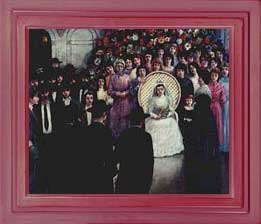Wedding Maamar Maamarim of the Lubavitcher Rebbe,
Rabbi Menachem M. Schneerson
by Rabbi Yosef Shusterman
Before there were men and women there was a man and a woman,
and they got married. And even before that there was the Kabbalah
of marriage -- the cosmic bonding of the divine masculine and feminine
energies emerging from the Infinite Light to generate existence,
a world, and life.
There are two central marriage narratives in the Torah. In the first
human marriage, Adam and Chavah (Eve) are initially created as "a
single, two-faced body." The single being is split in two --
a man and a woman -- creating the essence of sexual tension: a primal
memory of original oneness, countered by the strangeness of otherness
and difference. The shadchan is G-d: He personally beautifies, perfumes
and bejewels the bride and presents her to the groom. Like every
groom, he's apprehensive; he wants to keep his options open. Married,
he sees the light. "This is it!" he proclaims. "A
bone of my bone, flesh of my flesh... Therefore a man will leave
his father and his mother and cleave to his wife, and they shall
become one flesh."
To become one. If man and woman would have simply remained the "single
being" that they initially were, there would have been no alienation,
no mystery, no reunion, no marriage. If they would have been initially
created as two distinct beings, the gap of difference would have
been insurmountable -- there would be no way for them to become
truly one. It is their intrinsic oneness, coupled with their acquired
distinctiveness and difference, that is the secret of marriage,
of creation, of life.
The second narrative is the story of the marriage of Isaac and Rebecca.
Here the focus is on the search: the particular qualities to be
sought in a spouse; the many pathways along which Divine Providence
leads two destined souls, born in different cities and cultures,
along the story line of their reunion; the "love at first sight"
that blooms at an initial meeting, and its grounding and deepening
after marriage; the insight (3,600 years before Freud) that in his
wife a man finds solace over the loss of his mother.
It is primarily from these two narratives that our grandfathers
and grandmothers more than a hundred generations of them -- have
drawn the wisdom, enchantment and devotion they invested in the
Jewish marriage. (from Chabad.org)
